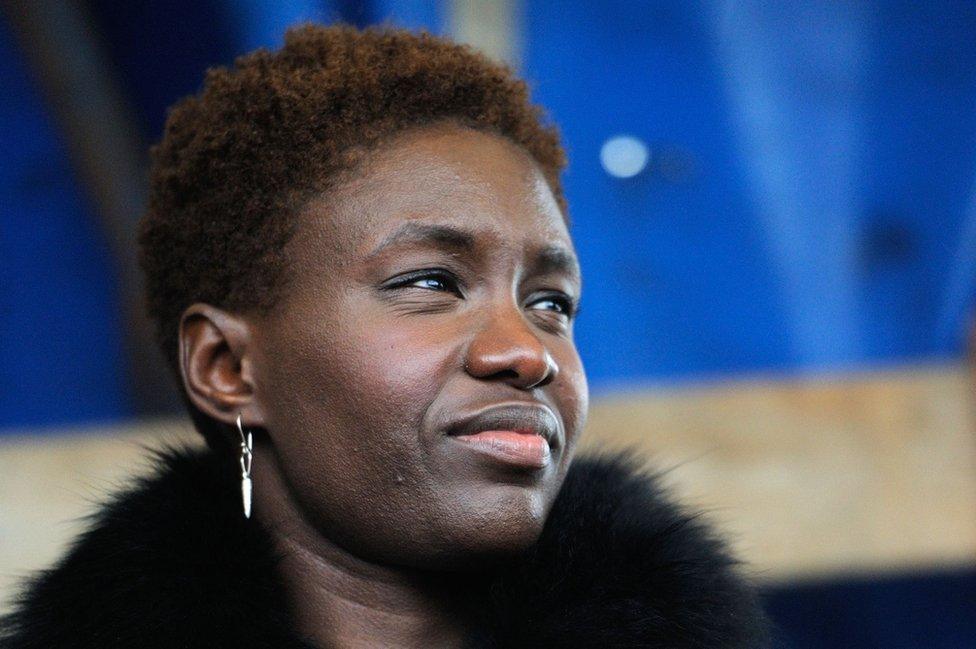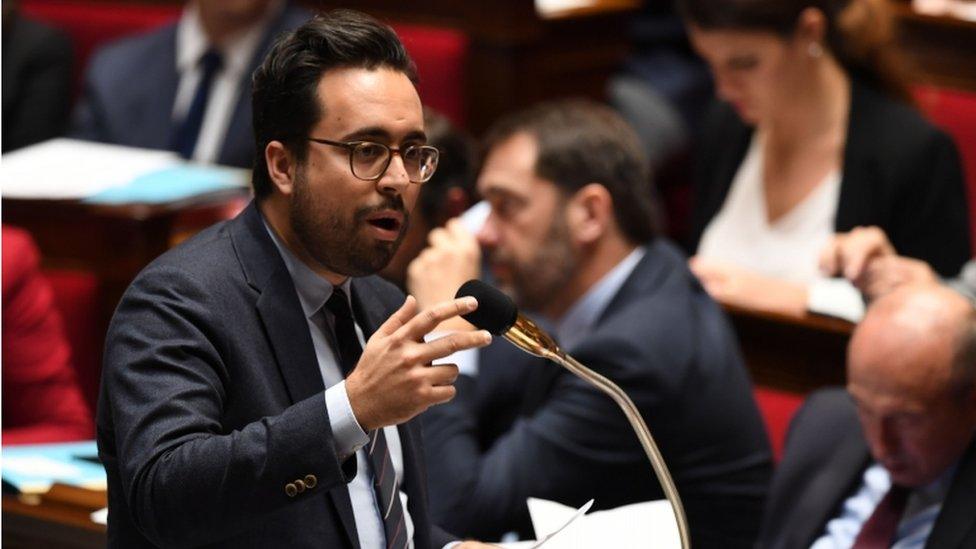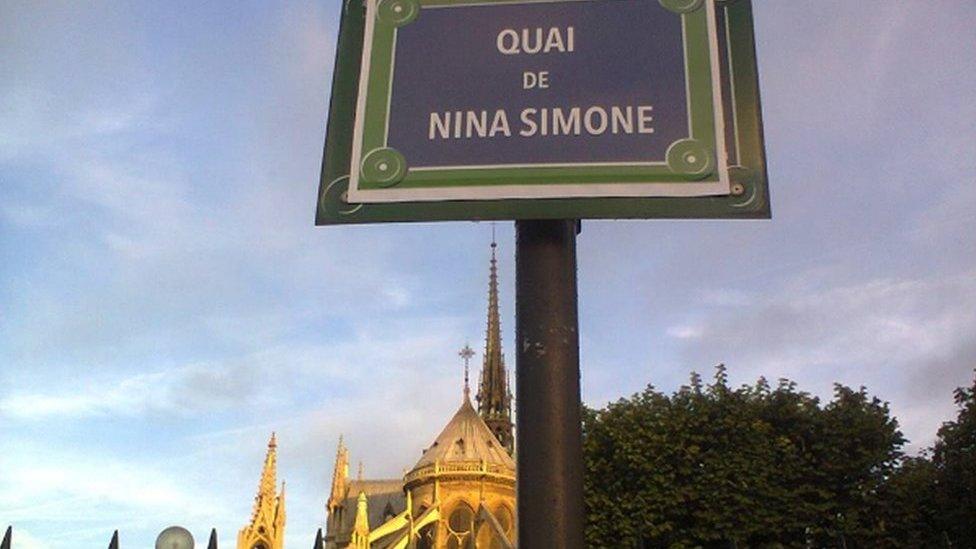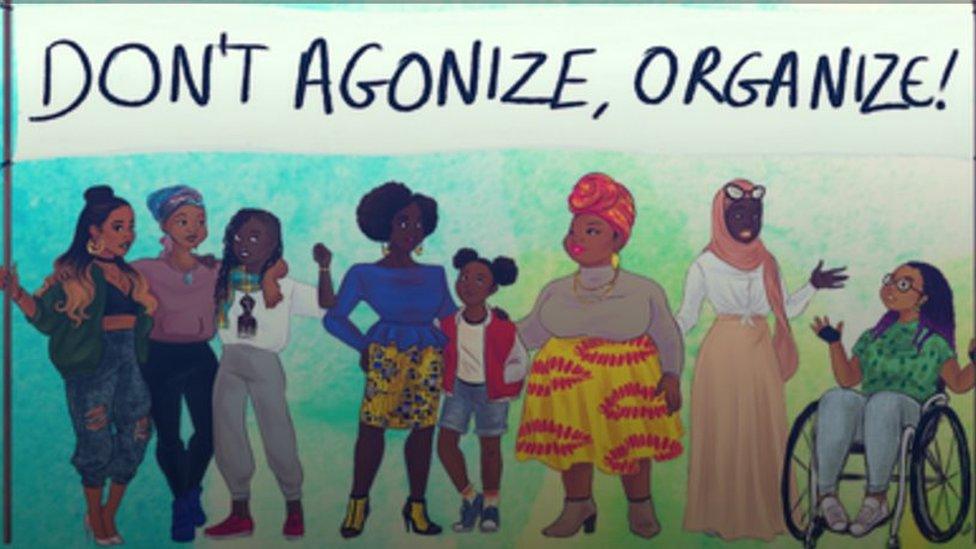Row over French anti-racist lands minister in mess
- Published

Rokhaya Diallo has accused mainstream feminists who oppose the Islamic veil of "perpetuating racist oppression"
A French campaigner on race and feminist issues has landed the government of President Emmanuel Macron in an embarrassing mess, after she was deselected from an official advisory committee apparently because of her outspoken views.
Rokhaya Diallo, a 39-year-old journalist of West African origin, was one of 30 personalities named a week ago to the National Digital Council, a quasi-governmental body whose task is to analyse the impact of new information technologies on society.
But just a few days later the minister for digital affairs, Mounir Mahjoubi, asked for a new list of names, making it clear that Ms Diallo's presence on the panel was not conducive to the necessary "serenity" for the council to do its job.
It followed pressure from opponents of Ms Diallo - not all of them on the political right - who say her past comments decrying "state racism" in France and defending the Islamic veil show she is unfit for a position advising ministers.
'Intersectional' feminism
But the government's decision to remove her has now backfired badly, with the council's president on Tuesday leading a mass resignation of members in protest against the interference.
Even critics of Ms Diallo have denounced what they see a crass bid to silence an awkward voice.
The row is interesting because it throws into relief the emergence of a new strand of left-wing activism in France.

Mounir Mahjoubi
Heavily influenced by radicals in the United States, these activists - and Ms Diallo is a prime example - are not afraid to challenge the established feminist and anti-racist movements in France, who they regard as conformist and irrelevant to the younger generation.
Ms Diallo describes herself as an intersectional feminist, which means that she sees feminism as part of a wider fight to defend the interests of black people and Muslims against a white European ascendancy.
However, her views remain highly controversial in a country which likes to see itself as a champion of human rights. Her defence of the veil, and championing of black-only discussion groups, fly in the face of the "universalism" that has traditionally shaped left-wing thinking in France.
Critics note that Ms Diallo once described the veil as a "signifier of feminism" in the same way as high heels or a miniskirt.
In 2011, following a bomb attack on the offices of Charlie Hebdo, she signed a petition opposing expressions of support for the satirical magazine on the grounds that it revelled in targeting Islam.
Herself a Muslim who does not wear the veil, Ms Diallo has accused mainstream feminists of "perpetuating racist oppression" towards Muslim women who do wear it, by "refusing to let them think and speak for themselves".
And she has spoken in favour of "decolonial" discussion groups - off limits to whites - where black people can speak openly about their feelings.
'Witch hunt'
Such views remain anathema to many in France who would otherwise describe themselves as progressive. They see the new radicalism as articulated by Ms Diallo as an open door to American-style politics, in which society decomposes into racial blocs.
"Telling the world that France is structurally racist is like saying there is a form of apartheid in France. And that is unacceptable," said the Socialist MP Amine el-Khatmi, who is one of Ms Diallo's most outspoken opponents.
But if intersectionality remains a minority interest in France, it is nonetheless a growing force, with momentum that comes from its wider acceptance in the US and other countries. Ms Diallo, who now appears on a popular TV chat show, is an attractive and articulate advocate.
Even right wingers think the government made a big mistake in dumping her from its committee.
"I don't agree about anything with Rokhaya Diallo," said Elisabeth Levy of Causeur magazine. "But these witch hunts have no place in the country of the Enlightenment.
"Allow us to shout at each other in peace!"
- Published26 August 2015

- Published30 May 2017

- Published18 February 2017
